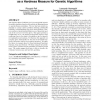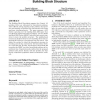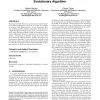GECCO
2007
Springer
15 years 6 months ago
2007
Springer
The Negative Slope Coefficient (nsc) is an empirical measure of problem hardness based on the analysis of offspring-fitness vs. parent-fitness scatterplots. The nsc has been teste...
105
Voted
GECCO
2007
Springer
15 years 6 months ago
2007
Springer
In this research, we compare four different evaluation methods in coevolution on the Majority Function problem. The size of the problem is selected such that an evaluation against...
116
click to vote
GECCO
2007
Springer
15 years 6 months ago
2007
Springer
The development of coherent and dynamic behaviors for mobile robots is an exceedingly complex endeavor ruled by task objectives, environmental dynamics and the interactions within...
104
click to vote
GECCO
2007
Springer
15 years 6 months ago
2007
Springer
EVITA, standing for Evolutionary Inventory and Transportation Algorithm, aims to be a commercial tool to address the problem of minimising both the transport and inventory costs o...
GECCO
2007
Springer
15 years 6 months ago
2007
Springer
In this paper we introduce XCSF with support vector prediction: the problem of learning the prediction function is solved as a support vector regression problem and each classifie...
107
click to vote
GECCO
2007
Springer
15 years 6 months ago
2007
Springer
The Building Block Hypothesis suggests that Genetic Algorithms (GAs) are well-suited for hierarchical problems, where efficient solving requires proper problem decomposition and a...
116
Voted
GECCO
2007
Springer
15 years 6 months ago
2007
Springer
While support vector machines (SVMs) have shown great promise in supervised classification problems, researchers have had to rely on expert domain knowledge when choosing the SVM&...
GECCO
2007
Springer
15 years 6 months ago
2007
Springer
Studying metabolic fluxes is a crucial aspect of understanding biological phenotypes. However, it is often not possible to measure these fluxes directly. As an alternative, fluxom...
128
click to vote
GECCO
2007
Springer
15 years 6 months ago
2007
Springer
Recently, evolutionary computation has been successfully integrated into statistical learning methods. A Support Vector Machine (SVM) using evolution strategies for its optimizati...
130
click to vote
GECCO
2007
Springer
15 years 6 months ago
2007
Springer
Model Checking is a well-known and fully automatic technique for checking software properties, usually given as temporal logic formulae on the program variables. Most model checke...



